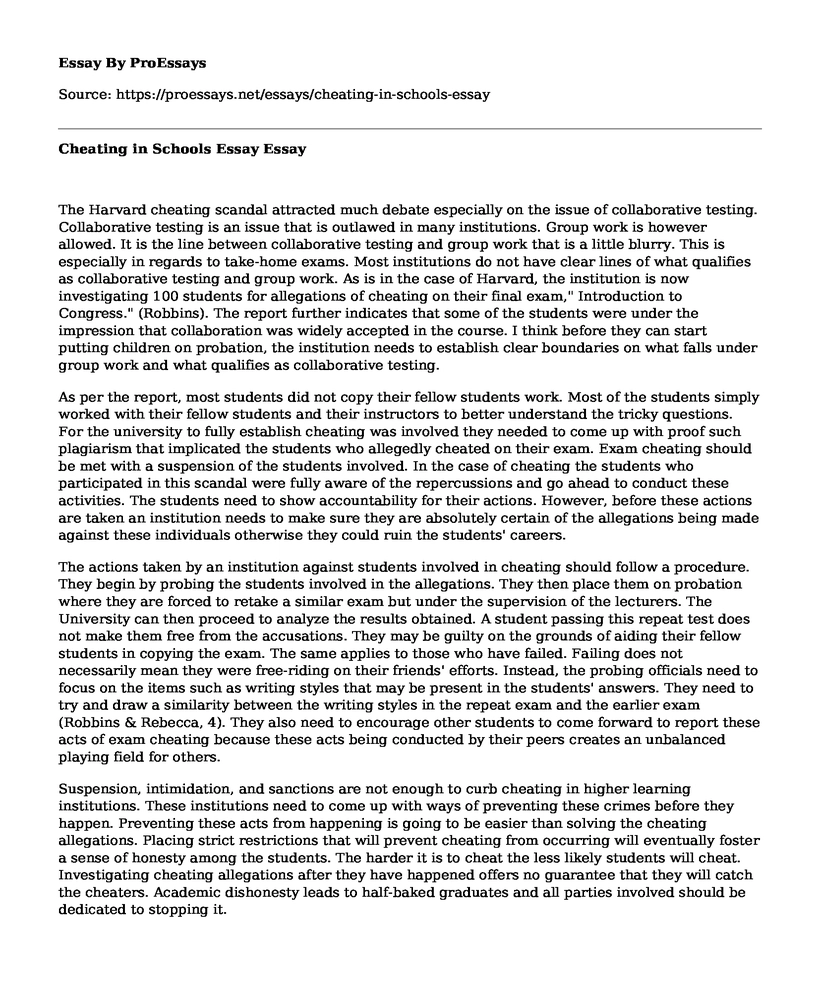The Harvard cheating scandal attracted much debate especially on the issue of collaborative testing. Collaborative testing is an issue that is outlawed in many institutions. Group work is however allowed. It is the line between collaborative testing and group work that is a little blurry. This is especially in regards to take-home exams. Most institutions do not have clear lines of what qualifies as collaborative testing and group work. As is in the case of Harvard, the institution is now investigating 100 students for allegations of cheating on their final exam," Introduction to Congress." (Robbins). The report further indicates that some of the students were under the impression that collaboration was widely accepted in the course. I think before they can start putting children on probation, the institution needs to establish clear boundaries on what falls under group work and what qualifies as collaborative testing.
As per the report, most students did not copy their fellow students work. Most of the students simply worked with their fellow students and their instructors to better understand the tricky questions. For the university to fully establish cheating was involved they needed to come up with proof such plagiarism that implicated the students who allegedly cheated on their exam. Exam cheating should be met with a suspension of the students involved. In the case of cheating the students who participated in this scandal were fully aware of the repercussions and go ahead to conduct these activities. The students need to show accountability for their actions. However, before these actions are taken an institution needs to make sure they are absolutely certain of the allegations being made against these individuals otherwise they could ruin the students' careers.
The actions taken by an institution against students involved in cheating should follow a procedure. They begin by probing the students involved in the allegations. They then place them on probation where they are forced to retake a similar exam but under the supervision of the lecturers. The University can then proceed to analyze the results obtained. A student passing this repeat test does not make them free from the accusations. They may be guilty on the grounds of aiding their fellow students in copying the exam. The same applies to those who have failed. Failing does not necessarily mean they were free-riding on their friends' efforts. Instead, the probing officials need to focus on the items such as writing styles that may be present in the students' answers. They need to try and draw a similarity between the writing styles in the repeat exam and the earlier exam (Robbins & Rebecca, 4). They also need to encourage other students to come forward to report these acts of exam cheating because these acts being conducted by their peers creates an unbalanced playing field for others.
Suspension, intimidation, and sanctions are not enough to curb cheating in higher learning institutions. These institutions need to come up with ways of preventing these crimes before they happen. Preventing these acts from happening is going to be easier than solving the cheating allegations. Placing strict restrictions that will prevent cheating from occurring will eventually foster a sense of honesty among the students. The harder it is to cheat the less likely students will cheat. Investigating cheating allegations after they have happened offers no guarantee that they will catch the cheaters. Academic dishonesty leads to half-baked graduates and all parties involved should be dedicated to stopping it.
Work Cited
Robbins, Rebecca D. Havard Investigates 'Unprecedented' Academic Dishonesty Case. 30th August 2012. 06 March 2018 <www.thecrimson.com>.
Cite this page
Cheating in Schools Essay. (2022, Mar 29). Retrieved from https://proessays.net/essays/cheating-in-schools-essay
If you are the original author of this essay and no longer wish to have it published on the ProEssays website, please click below to request its removal:
- Adverse Childhood Experiences - Essay Sample
- Essay Sample on Linguistic Instrumentation
- Essay Example on Conflict Resolution in Schools: Challenges for Teachers
- Paper Example on Learning Styles in Student Evaluation
- Essay Example on Homeschooling: Flexibility & Isolation Challenges
- Essay Sample on Teaching for Cultural Diversity: Benefits of Varied Learning Materials & Methods
- Summary of a Critical Thinking Article - Free Paper Sample







